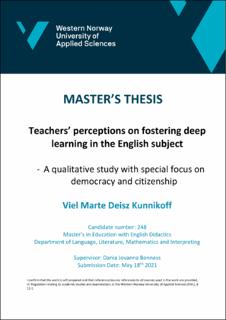| dc.description.abstract | This Master’s thesis is written in the field of English didactics and aims to investigate teachers’ perceptions on deep learning, and how the use of deep learning can foster the democratic competence in the English subject. The thesis is written shortly after the implementation of a new curriculum (LK20) started.
This thesis is based on a qualitative study, where the data collection consists of two focus group interviews with six teachers. The teachers work at two different schools, one primary and one secondary school. A thematic analysis has been used to identify patterns and withdraw data relevant to answer the research questions.
The findings in this study show that the teachers perceive deep learning as a complex term which can be interpreted in many ways. Deep learning is about learning something thoroughly and therefore being able to see connections to other subjects and situations. However, the aspect of deep learning is not new in itself, and several of the teachers state that they have been working with topics thoroughly for a long period of time. The new focus on deep learning in the new curriculum LK20 is perceived as an opportunity to spend more time on specific topics, being able to explore them from different perspectives. In addition, the findings show that the teachers implement deep learning in their teaching by focusing on working methods like exploring, the question method, station work, dialogue play, varied teaching and collaboration with other students. There is also an enhanced focus on interdisciplinary projects to get in-depth knowledge about the same topic from different perspectives. Additionally, the findings reveal that deep learning may foster democracy and citizenship in the English subject, as the students are to thoroughly learn about other cultures and the thoughts behind democratic processes. This is emphasized through the focus on gaining cultural knowledge, taking on others’ perspectives and the focus on becoming accountable citizens. Deep learning can therefore foster democracy and citizenship, as this knowledge gives the students the ability to impact their environment on a local level, like their classroom, but over time also make an impact to the world on a regional, national or even a global level, for instance through active participation in politics. | en_US |

